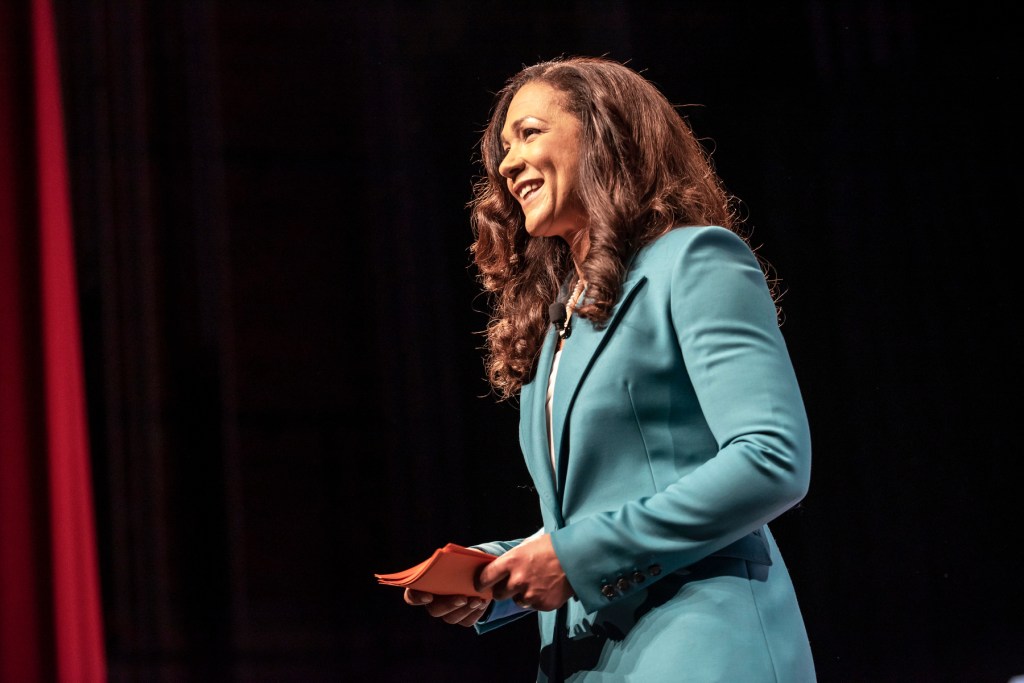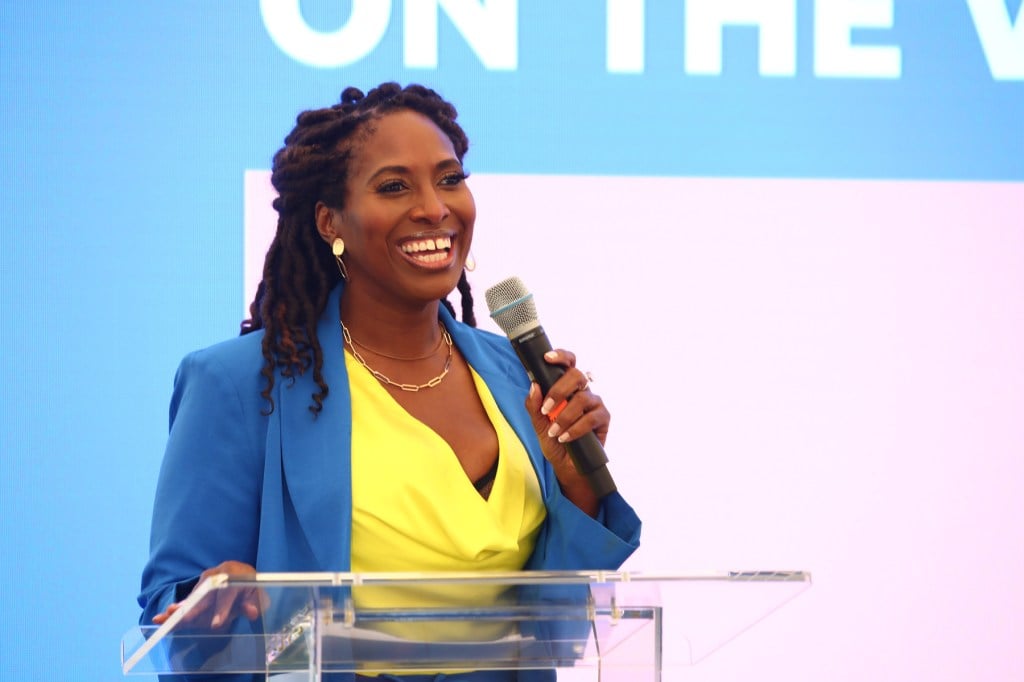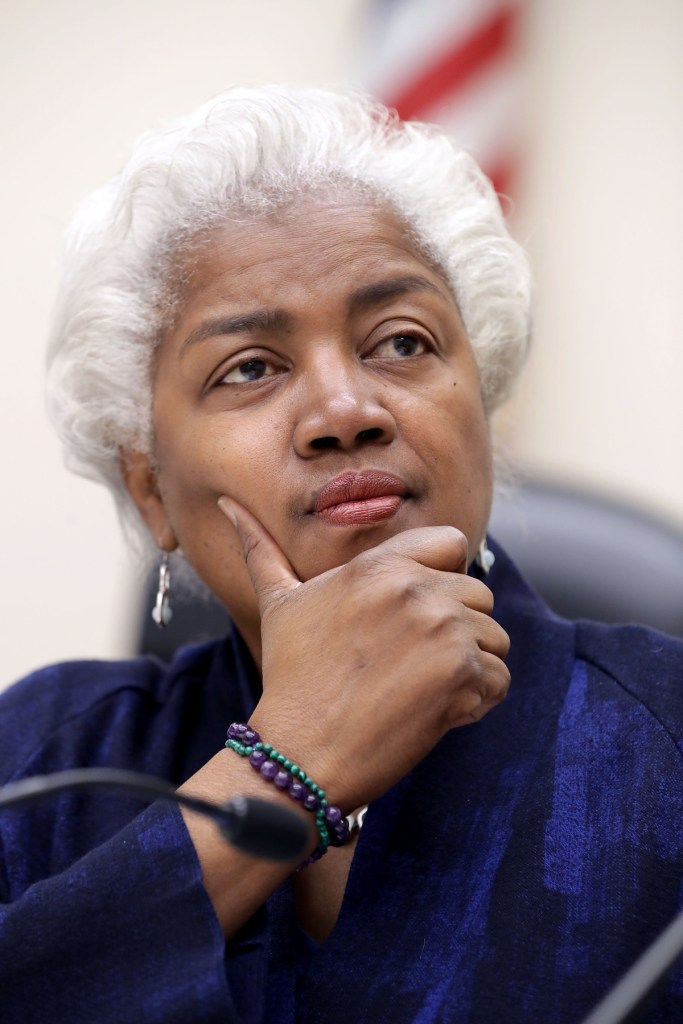When July 21, 2024, arrived, Black women were ready.
President Joe Biden announced he was stepping down as the Democratic presidential nominee and endorsed Vice President Kamala Harris to succeed him, making her the first Black and South Asian woman to lead the top of a major party presidential ticket. That afternoon, Black women led the party in starting to coalesce behind her. And that evening, over 44,000 Black women gathered for a previously planned Zoom call that became a rallying cry and raised over $1.5 million for Harris’ nascent campaign in less than two hours.
Longtime top Democratic strategist Donna Brazile spent her day juggling TV hits on ABC News, where she’s a contributor, with working the phones to help lock down support for Harris. Minyon Moore, the chair of the Democratic National Convention, was at work on plans for the party’s big nominating event, just a month away, in Chicago. Glynda Carr, president and CEO of Higher Heights for America, and Jara Butler, chief impact officer at Supermajority, were both in Texas with their respective families. Jotaka Eaddy, a social impact consultant, investor and founder of the weekly Win With Black Women Zoom calls, was at her childhood home in South Carolina.
The 19th spoke to half a dozen leading Black women in Democratic politics about their recollections of July 21 and that historic Win With Black Women call. For Aimee Allison, founder and president of She The People, an organization focused on uplifting and elevating women of color in politics, having someone like Harris as a Democratic presidential nominee had been “a far-off dream.”

(Sergio Flores/Getty Images)
“It felt like a dream come true for me, and it felt like a dream come true for a country who’d had this history of excluding people like us to really come together — around not only a person because it wasn’t just about Kamala Harris, but it was around this ideal for multiracial democracy and representation,” Allison said. “And that’s what I’ve been fighting for 30 years for, and my whole life was dedicated to this.”
While Harris quickly locked down support, nothing about that day was inevitable. Harris’ path to the Democratic presidential nomination resulted from her two-decade trajectory from local office to the second-highest in the land. And over a historic 12 hours, Harris and the Black women supporting her applied decades of their organizing experience and new technology to the unprecedented moment.
“What Black women do on a Sunday is prepare our week,” said Carr of Higher Heights for America, which supports Black women running for office.
“So from our Sunday brunch conversation to the evening conversation, Black women were able to gather across the country, across socioeconomic backgrounds, across industry, for a moment,” she added. “And then we hit the ground and spent time organizing our individual network and our collective network for this historic campaign.”
Black women are the base and backbone of the Democratic Party and the progressive movement. But in progressive spaces, Black women are “sometimes placed on a pedestal” to be seen and not heard from, said Butler of Supermajority, a grassroots organization focused on engaging a multiracial coalition of young progressive women. On July 21, 2024, Butler said, Black women “threw the gauntlet down.”
“And to me, that was a loud roar — you see us and you’re going to hear us,” she said. “And it was something that they couldn’t ignore. I think that’s what was so palpable about it.”
Black women who spoke to The 19th recalled the day in timestamps, flashes and vignettes: the group chats that blew up, the frantic phone calls and texts. The feelings of inspiration, rapturous joy and solemnity about the gravity of the moment in equal parts. A show of force that evening on Zoom that “helped to catapult and shift history,” said Eaddy.
“We never forget, nor will we ever mute the power that we had in that moment and the trajectory of the power that we had after that moment,” she said. “Because what we did is that we sparked something special.”
At 10:46 a.m. Pacific and 1:46 p.m. Eastern time, Biden ended weeks of speculation about his future with the announcement heard around the world: He was dropping out of the presidential election. Allison was in Oakland, California, looking out the window of her home office. She had just planted redwood trees — a feature of the Bay Area, where Harris also called home and launched her political career.
“There I was looking out at these three Sequoia sempervirens, native redwood trees, knowing that they were going to outlive all of us,” she said. “When I looked at my phone, and I started getting the texts, I was like, ‘Wow, this is something that’s going to be bigger than all of us, this opportunity.’”
Across the country, Eaddy was sitting on the porch of her parents’ house texting with other politicos and allies, who decided to all hop on her Zoom line. Eaddy was determined that Harris, as Biden’s vice president, would not be passed over for other candidates.
“I think it was maybe 20 minutes later, the president put out a statement that he was supporting Kamala Harris,” she said. “And that is when we were like, OK, we’ve got to show our biggest support for her, because we knew politically, there were going to be others that might try to jump in there.”

(Adam Glanzman/Getty Images for Paramount)
Eaddy started Win With Black Women in August 2020 to coordinate support for the Black women who were in contention to be Biden’s running mate. The weekly calls, held Sunday nights, grew to focus on uplifting and elevating Black women in all areas of American society. Past calls had featured celebrity guests including Oprah Winfrey and Meghan, Duchess of Sussex. But the call invites were mainly distributed through a listserv of about 6,000 to 7,000 people and word of mouth. No previous call, Eaddy said, had seen more than 1,000 attendees, and she expected no more than that to join the July 21 call.
Before Biden announced, Rep. Joyce Beatty of Ohio, Rep. Jasmine Crockett of Texas and Brazile were already scheduled to speak on the July 21 call. But Eaddy knew she needed a new plan.
“We were very clear in that moment that if anyone was going to try to navigate around or skip over Kamala Harris, that there was a wall of determined Black women that they were going to have to go through,” Eaddy recalled.
That day was a team effort of Black women around the country. Eaddy, Carr, Butler and Allison began huddling with their teams and strategizing with their networks. Moore and Brazile, two of the country’s leading Black women Democratic strategists, worked behind the scenes.
That morning, Moore was conducting a Zoom briefing with members of the vice president’s team. Then, she got a call from a top campaign official, informing her he believed Biden was planning on dropping out that day.
“Simultaneously, I was texting one of the staff members to ask them: Had they spoken with the vice president? And it just seems like everything kind of collided together,” she said. “And that’s when we discovered that she had just gotten a call from the president. So things began to shift in their world pretty quickly.”
The weeks following Biden’s disastrous June 27, 2024, debate against President Donald Trump had been tumultuous for the party and for Brazile, the former chair of the Democratic National Committee who had managed campaigns and advised top Democrats for over 40 years.
Brazile’s expert knowledge of Democratic Party rules and how the party’s nomination process would work after primaries had been held meant she was “swept” into a role as a party leader, she recalled, focused less on the historic nature of Harris’ potential candidacy than she was on “keeping the rules of procedure on schedule.” Brazile was close to Biden and had known him for over 35 years — she knew only he could decide his future and no one could pressure him into a decision.
“I had to keep going; it was as if we were in a tunnel without a way out of the tunnel,” she said. “But we knew we had to get out the tunnel.”
Delegates had not formally nominated Biden, meaning that they could vote for another nominee. But Biden’s team and the DNC were running up against an important deadline: the meeting of the DNC Credentials Committee, where delegates to the convention are certified, at 2 p.m. on the 21st. Top Biden adviser Steve Ricchetti had called Brazile, a member of that committee and a decades-long member of the DNC’s Rules and Bylaws Committee, to ask for her thoughts and guidance on how things could unfold procedurally, depending on Biden’s decision.
Brazile had spent the weekend calling Democratic elected officials and stakeholders to shore up support for Biden, if he stayed in, and for Harris, if she replaced Biden on the ticket.
“I could pick up the phone and call members of Congress. I could call donors. I got cussed out too — let’s be very clear, I got cussed out a lot,” Brazile said. “I could call union presidents, union leaders, state party chairs, activists, organizers. For me, I was in my element. I was in my element because at my core, I’m a warrior.”

(Chip Somodevilla/Getty Images)
By the time Brazile appeared on ABC News on Sunday morning, she was confident that if Biden stayed in the race, he would keep most of his delegates, and that if he stepped aside, Harris would win most of them.
“I felt certain because I was on a twofold mission to protect Joe, that’s number one, and my second mission was to protect Kamala,” Brazile recalled. “I had no other assignment. No one could give me another one, no one could tell me anything.”
Biden’s 1:46 p.m. post announcing he was stepping aside was sent 14 minutes before the start of the Credentials Committee meeting. His 2:13 p.m. post endorsing Harris sparked a new round of calls, this time on behalf of Harris.
“Once the president decided to step back and he endorsed the vice president, I got back on the phone,” Brazile said. “In between 3 and 8, ABC sent a makeup person to my house who had to take care of my dog because I was working the phones.”
Brazile, Moore and others also knew they had a limited window to tamp down calls for Democrats to hold a “mini primary” or an open convention instead of backing Harris.
As a member of the Biden-Harris presidential ticket, Harris had also been on primary voters’ ballots and was best poised to inherit the Biden campaign’s infrastructure and war chest. “The president and the vice president actually ran for reelection. The voters had spoken. So this process that they invented in their minds did not exist,” Moore said.
Since Harris’ general election loss, some have questioned the push to get Democratic officials and delegates to line up behind Harris.
“If I want to go back now and look at, should we have made a different decision last year? No,” Brazile said. “But we made the call. I think we made the right call. And I’m grateful. I’m glad to have been a part of that moment.”
Eaddy had a plan going into the 8:30 p.m. Win With Black Women call. Her Zoom account allowed for 1,000 people at a time to join, so she planned to allow 950 people into the Zoom and save 50 slots for elected officials and high-profile figures.
That afternoon, Beatty predicted on television that 20,000 to 30,000 Black women would join that evening’s call. Around 4:30 or 5 p.m., Eaddy was on her Zoom line, talking with colleagues, when she noticed hundreds of people already in the waiting room for the 8:30 p.m. meeting.
At around 7:30 to 7:45 p.m., Eaddy tried to log on to prepare for the 8:30 call, only to find herself locked out of her Zoom account because too many people were on the call. She scrambled to change the meeting to a webinar, with a 3,000-person capacity, and sent out a new Zoom link to the Win With Black Women listserv as her phone was blowing up. “I think I had 500 missed phone calls, and my parents were there, and I had my dad just hitting the X button,” she said.
That webinar also quickly reached capacity. But “Black women, as they always do, get creative,” Eaddy said. One woman on the call, Artis Hampshire-Cowan, called up a connection she had to a Zoom executive who worked on the back end to allow more participants — over 44,000 — to join the call.
“It was good organizing and great timing to give the nation’s most committed pro-democracy forces and organizers a place to meet and commit to the road ahead,” Allison said. “It was pretty remarkable.”
The oft-cited 44,000 number accounts for the women who made it into the Zoom webinar. But it doesn’t capture the sheer resolve of the tens of thousands of others who wanted to be part of the moment.
Some 30,000 more were listening on the livestream app Clubhouse, Eaddy said. Other participants were livestreaming the call on platforms like Twitch, Instagram Live, YouTube and Google Meet. There were phones held up to computers put on speaker and “Zooms of Zooms” — one woman later told Eaddy that she set up a free conference call line that 10,000 people dialed into to listen to the call. Eaddy estimates that well over 200,000 people either tuned in or listened in.
“It showed the power and the determination for Black women to be in unity, to be in action and to be in sisterhood, all focused on Vice President Kamala Harris and her historic bid for what we believe was her due right at the top of the ticket,” Eaddy said.
Butler knew the road ahead would be difficult and that Harris was set to be subject to an entirely new level of scrutiny and attacks from both sides of the aisle. But she wanted a moment in a “bubble” to celebrate Harris and be in community.
“I was able to let my guard down, and just I didn’t have to do anything,” Butler recalled. “All I had to do was just sit there and listen and cry, and I’m not a crier. And joining with my friends, joining with my 75-year-old mother, who voted for Shirley Chisholm, and the aunties I have … just hearing the joy that they had and the elation that they had, that just filled me with purpose.”
As the night bled into the early morning hours, Eaddy had to end the Zoom call for everyone.
“You hit that red button on Zoom, and it was the hardest thing, because it felt like we were in this long hug. When I hung up, it was still maybe 20,000 people on the phone at 1:30 a.m.,” she said. “I didn’t want to hang up because it felt like I was putting my arm down from this big, colossal hug, this warmth.”
That night, Eaddy didn’t sleep well. But it was “beautiful” to sleep in her childhood bedroom in the house on a dirt road she grew up on, where her story first began and from which a much bigger movement sparked. “I thought it was symbolic of the power and will of particularly Black women and Black folks in this country,” Eaddy said.
That Win With Black Women call inspired a Black Men for Harris call the next evening, and Eaddy found herself advising other groups who wanted to follow suit with similar Zoom webinars. All those groups, she said, raised a collective $20 million for Harris’ campaign.
For many Black women, Harris’ loss to Trump in November was devastating. But as they look ahead, they reflect on lessons learned in 2024 — and want to carry the energy, power and enthusiasm they captured into 2026 and beyond.
“My hope for the midterms is that Black women never cease to hold dearly the power that we have,” Eaddy said. “And if they forget it for a moment, if it just fleets for a moment, that they tap back into July 21 and what that felt like, and what we sparked together as Black women.”
Great Job Grace Panetta & the Team @ The 19th Source link for sharing this story.



